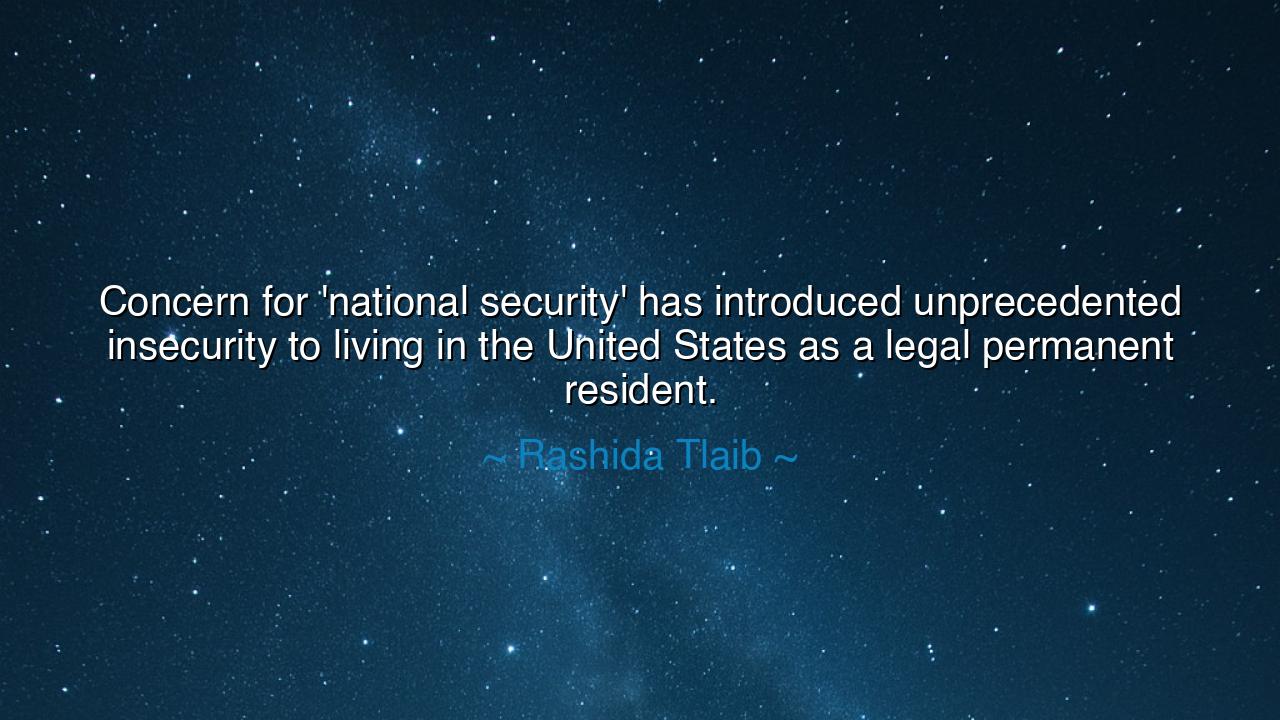
Concern for 'national security' has introduced unprecedented
Concern for 'national security' has introduced unprecedented insecurity to living in the United States as a legal permanent resident.






"Concern for 'national security' has introduced unprecedented insecurity to living in the United States as a legal permanent resident." Thus spoke Rashida Tlaib, her voice carrying both sorrow and indignation, unveiling a paradox that has haunted nations since the dawn of governance: that in the pursuit of security, governments often sow the seeds of fear among the very people they claim to protect. Her words remind us that when suspicion becomes policy, when fear dictates law, then even those who walk lawfully within the gates of the nation find themselves burdened by a cloud of doubt and danger.
The origin of this wisdom lies in the aftermath of great upheavals, when cries of national security have often drowned out the quieter voice of justice. In the United States, especially after the attacks of September 11, 2001, laws and policies were tightened, surveillance expanded, and the gaze of suspicion fell disproportionately upon immigrants and legal residents, particularly those of certain faiths or origins. What was meant to guard against threats from without began instead to corrode trust within, turning neighbors into suspects and permanent residents into fragile exiles in the land they sought to call home.
History bears heavy witness to this truth. During the Second World War, under the banner of national security, Japanese-Americans—citizens and legal residents alike—were uprooted from their homes and cast into internment camps. They were not accused individually, nor proven guilty, but treated as a collective danger by virtue of their ancestry. This act, born of fear, inflicted profound insecurity upon a loyal community. Tlaib’s words echo this past, reminding us that when security is pursued without balance, it becomes a weapon against the innocent.
Her statement is not merely political, but profoundly human. To be a legal permanent resident is to live in a fragile state of belonging—not yet a citizen, yet more than a guest. It is a life of striving, of building families, of contributing labor, of weaving oneself into the fabric of the nation. Yet, under the weight of suspicion, such residents live with trembling hearts, fearing that policies aimed at unseen enemies may sweep them away as collateral damage. Thus, the pursuit of security transforms daily life into uncertainty: a knock at the door, a policy change, a whispered rumor—all become shadows haunting the immigrant spirit.
And yet, within these words lies a heroic challenge to the people and leaders of any nation. True security cannot be built upon fear of the lawful; it must be rooted in trust, fairness, and justice. When a nation protects its people indiscriminately—citizens and residents alike—it grows stronger. When it divides them with suspicion, it weakens itself, for fear corrodes unity, and injustice breeds resentment. Tlaib calls us to see that security is not merely the absence of threat, but the presence of dignity and stability for all who live within a nation’s borders.
The lesson is clear: beware of sacrificing freedom and fairness upon the altar of national security. Question policies that sow fear among the innocent. Remember that true strength lies not in suspicion but in solidarity, not in exclusion but in justice. For every time a lawful resident is made to feel unsafe, the nation itself grows less secure, for it teaches its people that safety is conditional, not universal.
What practical steps must we take? Defend the rights of immigrants and residents, ensuring that security policies are transparent, fair, and narrowly tailored to true threats. Speak against discrimination disguised as protection, and support leaders who uphold liberty alongside vigilance. In daily life, extend solidarity to those who feel marginalized, remembering that justice is not the work of governments alone, but of communities and individuals.
So let Tlaib’s words be etched into memory: when security creates insecurity, the balance of justice has been lost. A nation that guards its people through fear builds only walls of sand, but a nation that protects all who live within it through justice builds walls of stone. May we choose the latter, and in so doing, offer both safety and dignity to every soul that calls the land their home.






AAdministratorAdministrator
Welcome, honored guests. Please leave a comment, we will respond soon